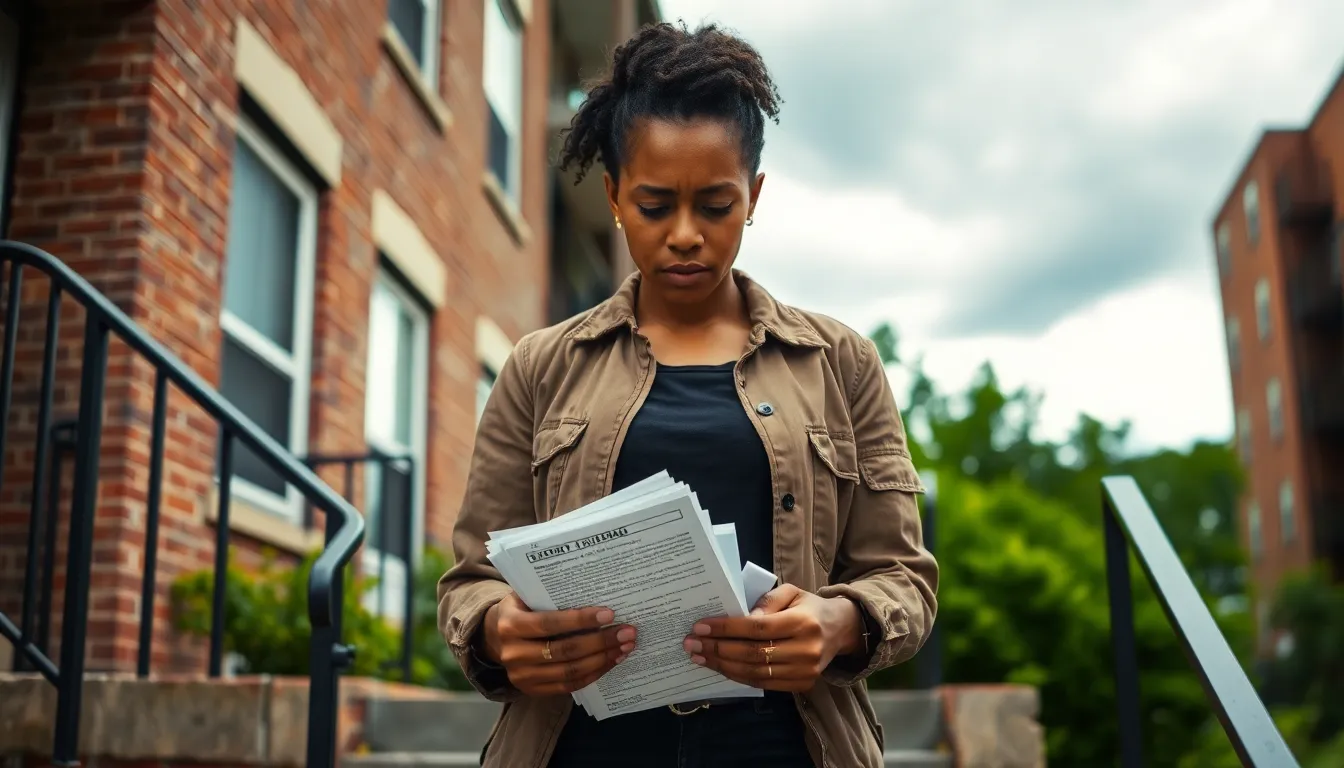Table of Contents
ToggleNavigating the world of tenant eviction rights can feel like trying to solve a Rubik’s Cube blindfolded. It’s a maze filled with legal jargon, deadlines, and a sprinkle of drama that could rival a soap opera. But fear not! Understanding your rights as a tenant is crucial, especially when facing the possibility of eviction.
Imagine being kicked out of your home without a fair chance to defend yourself. That’s not just unfair; it’s downright un-American! Knowing your rights can empower you to stand up for yourself and ensure that landlords play by the rules. So grab a cup of coffee, settle in, and let’s dive into the essential rights every tenant should know. After all, knowledge is power—and in this case, it might just keep you in your cozy living room a little longer.
Understanding Tenant Eviction Rights
Tenant eviction rights encompass legal protections ensuring tenants cannot be removed from their residences without due process. These rights vary by state and jurisdiction, so understanding local laws is crucial.
What Are Tenant Eviction Rights?
Tenant eviction rights protect individuals against unjust removal from rental properties. Specifics depend on lease agreements and regional laws. Tenants generally have the right to receive proper notice before eviction proceedings. For instance, many jurisdictions require 30 days’ notice if a tenant pays monthly rent. It’s essential for tenants to verify their rights regarding notice periods and acceptable reasons for eviction. Many states prohibit retaliatory evictions, meaning a landlord cannot evict a tenant simply for exercising their rights.
Importance of Knowing Your Rights
Knowing tenant eviction rights equips individuals with the tools needed to challenge wrongful evictions. Awareness of local laws benefits tenants in various situations. For example, being informed helps tenants identify legitimate reasons for eviction versus those that are unlawful. Additionally, understanding rights allows tenants to take swift action if faced with eviction threats. Many legal resources exist, offering guidance on navigating eviction processes and ensuring fair treatment.
Common Grounds for Eviction

Understanding the common grounds for eviction helps tenants recognize valid reasons a landlord may cite. Below are key categories that often lead to eviction.
Non-Payment of Rent
Non-payment of rent frequently serves as the primary reason for eviction. Tenants failing to pay on time or at all may face legal action. Landlords typically need to provide tenants with a notice of non-payment, allowing time to settle dues before pursuing eviction. States often require this notice, which usually spans three to five days. It’s crucial for tenants to communicate with landlords regarding financial difficulties or delays, as open dialogue may lead to alternative solutions.
Lease Violations
Lease violations encompass a variety of actions that breach rental agreements. Common examples include unauthorized pets, subleasing without permission, or excessive noise. When tenants breach lease terms, landlords may serve a notice to correct the violation. Depending on state laws, landlords might grant a specific timeframe to remedy the situation before proceeding with an eviction. Knowing the terms of a lease helps tenants avoid unintentional breaches that could lead to eviction.
Nuisance Complaints
Nuisance complaints often arise when a tenant’s actions disturb others or violate property rules. Examples include loud parties, aggressive behavior, or irresponsible behavior affecting neighbors. Landlords must investigate nuisance claims and provide tenants with a notice to cease such behavior. Failure to address the issues can result in eviction. Tenants facing nuisance claims should respond promptly and address any valid concerns to safeguard their residency.
The Eviction Process
Understanding the eviction process is crucial for tenants facing potential removal from their homes. This section outlines the notice requirements and legal proceedings involved in eviction.
Notice Requirements
Landlords must provide notice before initiating eviction proceedings. Typically, this notice spans 30 days for month-to-month tenants, though specific timeframes can vary by state. A formal written notice communicates the landlord’s intention and cites the reason for eviction. Retaliatory eviction notices lack legitimacy and cannot be issued if tenants have exercised their rights. Moreover, tenants should maintain copies of all correspondence to foster accountability throughout the process.
Legal Proceedings
If tenants do not remedy the situation post-notice, landlords may file a lawsuit for eviction. Courts manage eviction cases, and tenants receive a summons to appear. During this appearance, tenants can present their side, highlighting any disputes or wrongful accusations. Judges decide based on evidence and local laws, ensuring fair consideration. If a tenant loses, they may face a specified period to vacate, commonly ranging from a few days to a few weeks. Seeking legal advice and understanding local laws can strengthen tenants’ cases during this critical process.
Defending Against Eviction
Understanding how to defend against eviction can empower tenants facing this challenging situation. Knowledge of available strategies and resources often makes a significant difference.
Possible Defense Strategies
Tenants can employ several defense strategies to contest evictions. They might argue improper notice was given, which is crucial for legal proceedings. A tenant could also challenge the grounds for eviction, asserting that the reasons provided by the landlord are invalid. When a tenant has rectified a lease violation, they should document this to present evidence. Engaging in open communication with landlords can sometimes resolve issues before escalating to eviction. Utilizing local tenant organizations may offer additional support and strategies tailored to specific circumstances.
Legal Resources for Tenants
Access to legal resources greatly aids tenants defending against eviction. Local legal aid organizations provide free or low-cost assistance to individuals facing eviction. Various online platforms help tenants understand their rights and obligations. State-specific tenant rights groups often share valuable information about local laws. Courts frequently have self-help centers that guide tenants through legal processes. Utilizing these resources increases a tenant’s chances of a favorable outcome, especially when navigating complex legal situations.
Understanding tenant eviction rights is crucial for anyone facing potential eviction. By being informed about the legal protections in place tenants can effectively advocate for themselves. This knowledge not only empowers them to challenge wrongful evictions but also helps them navigate the often complex eviction process with confidence.
Engaging with local tenant organizations and utilizing available legal resources can further strengthen their position. Tenants should remember that open communication with landlords can often resolve issues before they escalate. By staying proactive and informed tenants can protect their homes and ensure their rights are upheld.








